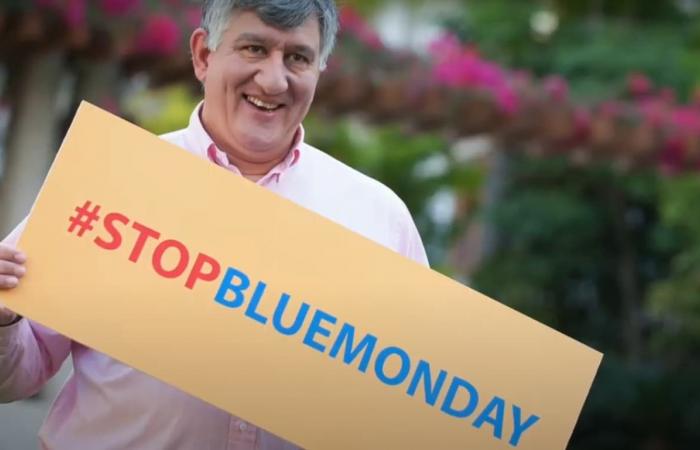You’ve probably heard of Blue Monday, defined as the most depressing day of the year. What if this was all a big scam? The concept was in any case created for marketing purposes, and it is the inventor himself who says so.
Blue Monday, the most depressing day of the year? The urban legend, which says that the third Monday in January corresponds to a peak of unhappiness, has a hard core. However, the concept was invented for advertising purposes.
Today, it is more of a concept that brands use to attract customers than a day dedicated to mental health. RMC Conso found the inventor of Blue Monday and looks back at the genesis of this real marketing scam.
The promotions linked to Blue Monday will not have escaped your attention. They flood the Web alongside the sales: “Blue Monday: up to -50% with the code BLUEM10”, indicates for example the hotel reservation site Barcelo.com.
“-15% for Blue Monday”, we also read on a creative hobbies site, -5% on an air conditioner sales site, or even, “for Blue Monday, all La Redoute Interiors sofas are transformed into Uber Eats promo codes”…
Blue Monday, an advertisement
But where does Blue Monday come from? How was this “most depressing day of the year” determined? Originally, it was actually an advertisement, as Cliff Arnall, the British psychologist who invented the concept, tells us.
“I was approached 20 years ago by an advertising agency. They asked me what I thought was the most depressing day of the year… It then pretty quickly became Blue Monday… But yes, It’s true, it was a travel agency that recruited me,” he remembers.
The advert was broadcast in 2005 by English travel television channel, Sky Travel, with the aim of encouraging potential customers to book their holidays to combat the so-called January blues.
At the time, Cliff Arnall was lecturing in psychology at Cardiff University in Wales. He claims to have developed an equation himself to define the famous third Monday in January as being the saddest of the year.
The latter is based on several criteria, such as the weather, debts, the period following the end-of-year holidays, broken good resolutions, lack of motivation or even the need for change.
According to the British newspaper The Guardian, the equation was rather invented by the advertising agency itself, for purely commercial purposes. The proposal would also have been sent to several psychologists. What Cliff Arnall refutes.
“Porter Novelli, the advertising agency, wanted me to develop a formula, which I did freely and they used what I sent them without changing anything. I kept all the emails, I can prove it,” he insists.
Stop Blue Monday, promote the Canary Islands…
But in 2010, in an interview with The Telegraph newspaper, Cliff Arnall still returned to the merits of Blue Monday, explaining that it was ultimately better to ignore it.
“My goal wasn’t for people to spend their money on booking a vacation, but to help them talk about their mental health. I came back to it to encourage discussion and say ‘I’d rather we forget about Blue Monday and that depression doesn’t exist’,” he says today.
He assures that he did not receive extravagant remuneration for this campaign:
-“I’m not going to reveal the exact amount, but given the hours of work spent on the formula, it comes to four euros an hour.”
Some British media claim remuneration of £1,200, or around 1,400 euros. But Cliff Arnall didn’t stop at this one experience: the same year, he also created the “happiest day of the year”, on behalf of the ice cream brand Wall’s, and then, ten years later , participated in a spot for the Canary Islands tourist committee.
He is seen there with a sign reading “Stop Blue Monday”, explaining how the sun and sea of the Canary Islands can help combat seasonal blues.
“I sincerely recommend the Canary Islands, even if they then used it for advertising, it was free advertising, they didn’t even pay me for the trip,” he defends himself on this subject.
If Cliff Arnall claims that he has always been keen to highlight mental health issues and not to make easy money, the irony of history remains in what is done today with this Blue Monday, a concept mainly used by brands to encourage their customers to buy more and more.
Overconsumption does not make you happy
He himself is not convinced by the idea that consuming would help fight depression.
“The best things you can do are free: spending time with your loved ones, being grateful for what you already have, cherishing your animals and nature is much more powerful than any purchase.”
What Johanna Rozenblum, clinical psychologist interviewed by RMC Conso, confirms:
“Consumption does not make you happier, it allows you to quickly access a need for reward. A bit like impulsive sugar consumption, the objective is to obtain pleasure immediately but in no way case of treating a low mood.”
The risk could even be the development of a disorder linked to compulsive buying. On the other hand, according to the professional, we must not deny the reality of seasonal depression, which really exists.
“It is true that the month of January is an emotionally difficult month. End of the holidays, lack of light, negative temperatures undermine emotional balance. In the office, the winter season is conducive to anxiety-depressive symptoms,” explains – she said.
One thing is certain, however: if you feel depressed, it is better to consult a health professional than to spend your money elsewhere.
As for Blue Monday, it will therefore remain what it has been since the beginning: a simple commercial operation.







